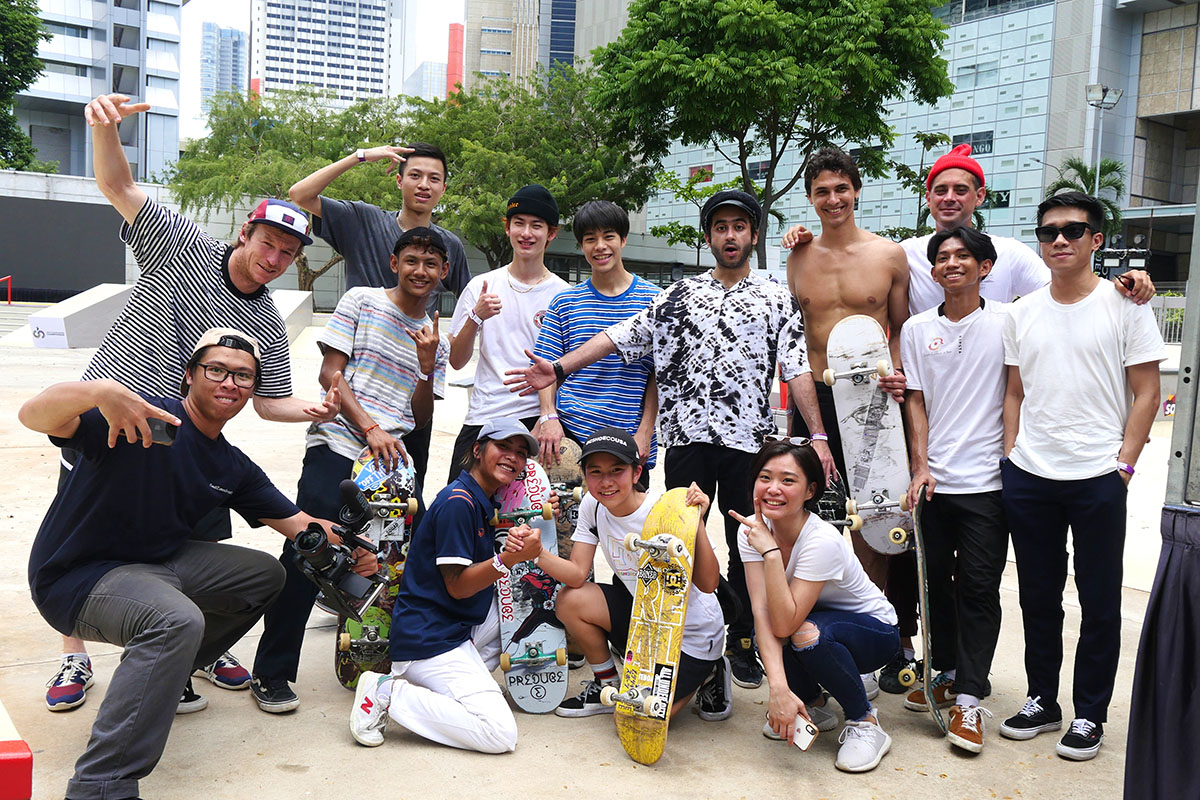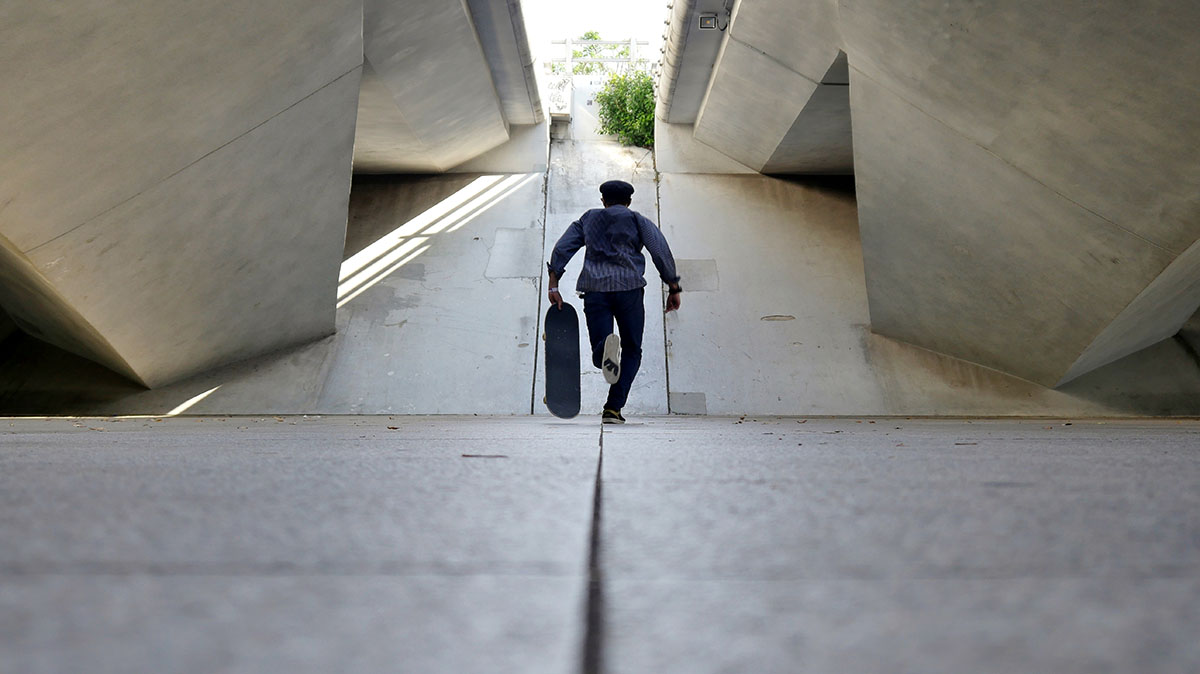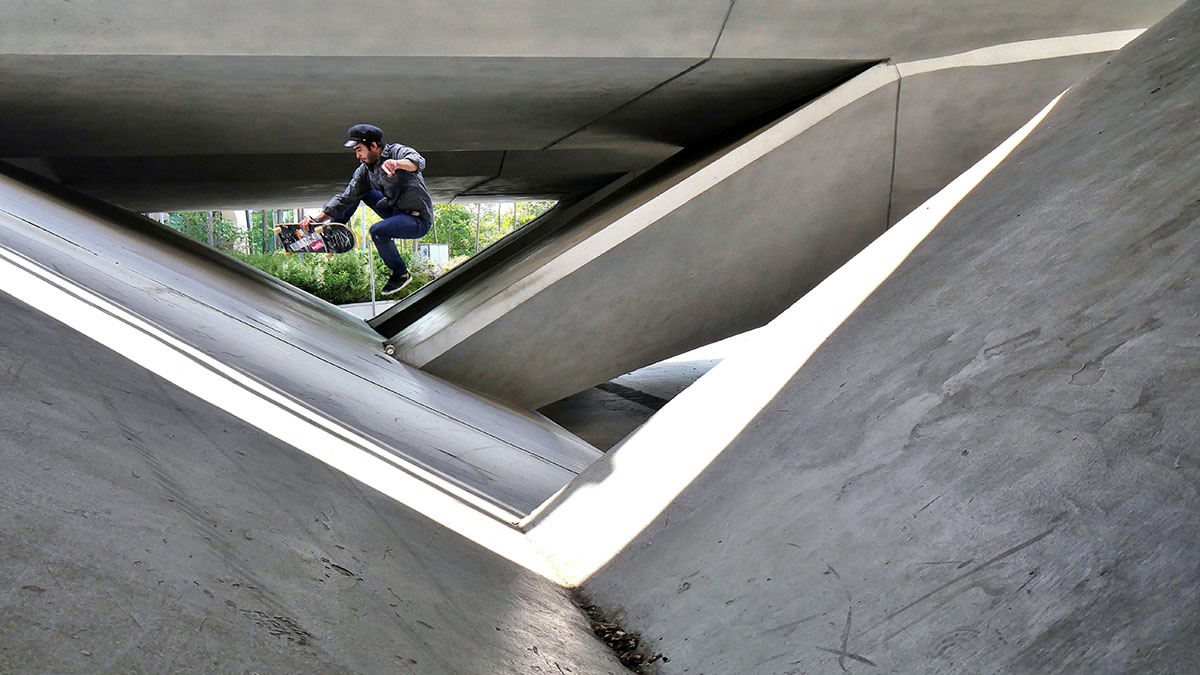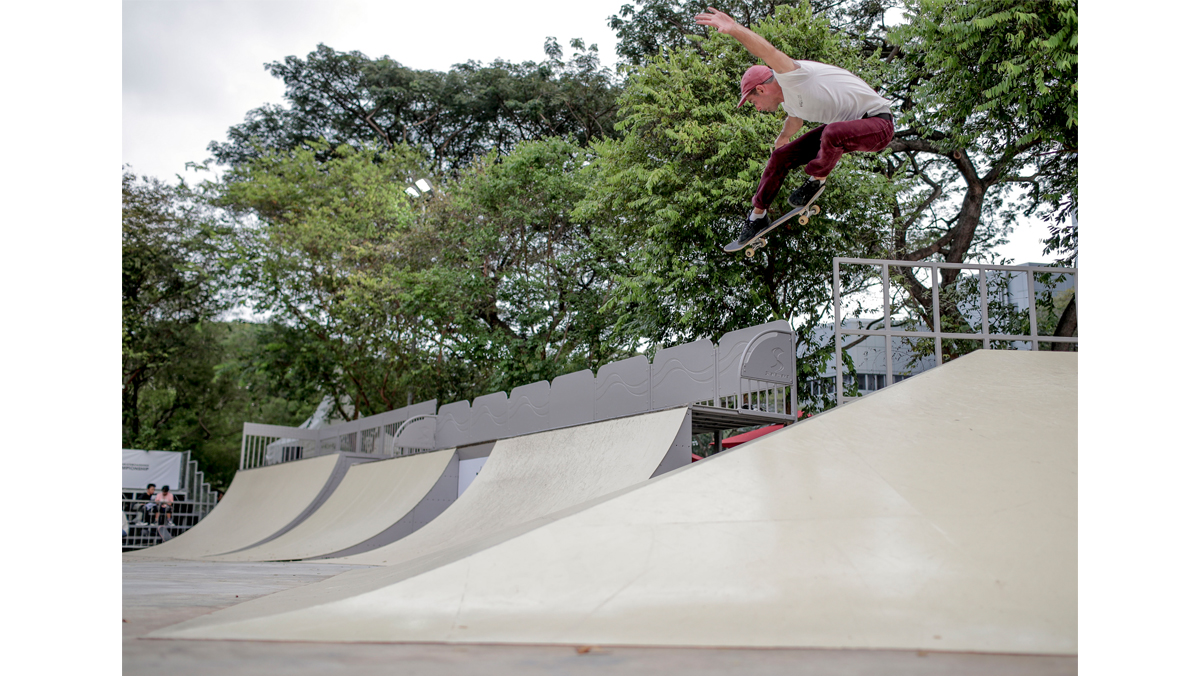Months ago now and just as countries were beginning to lock down in the face of COVID-19, the Asian Skateboard Championships were gearing up to hold an event that included skateboarders from dozens of countries across Asia. At that point in time things were changing by the hour. Hass Aminian and Kenny Reed were at the forefront trying to make things happen, keep people safe, and make the best of a bad situation. We had the opportunity to catch up with Kenny to get the break down on his role in planning the event, what ended up going down and what the future holds.

Photo: Gab Sarmiento
Tell me a bit about your involvement with the Asian Skateboard Championships in Singapore.
So for the Asian skateboarding championships, we wanted to put on a Continental Championship in Singapore. Every continent has the opportunity to put on a championship and it’s an opportunity for all countries on a continent to earn Olympic qualifying points. In some cases and for some skaters, it’s the only opportunity to earn those points.
I met Hass on another project and as soon as he told me what he was working on the Asian Skateboarding Championships I thought to myself…how many countries are in Asia and how often does it happen where these skaters have the opportunity to get together all at once?
I didn't know a lot about the International skateboarding competition scene in Asia before that. I’d seen a few things like the Asian Games and the Desert Games, but to me, this seemed like this could be the opportunity for an amazing skater either living in Asia or from Asia to really come out and be a part of this bigger community.
How did you originally get involved?
So Hass hired me to rebuild the skate park where we wanted to have it. Redesign and rebuild it, and then also to recruit skaters. I kind of gave myself that position. It wasn't really offered at first, but I kind of I drew it up. I was like, this is what I'm really interested in is reaching out to all the skateboard communities that I know of, finding out a way to reach the skateboarding communities that I don’t, and forming a comprehensive list. I made a deck of all 44 countries in Asia and all their relevant skate communities. If they don't have an NG, who would it would it be to contact and speak with about doing events and inviting skaters to come. While I was doing that research I asked questions like how many skate parks do you have? How many skaters do you have? How many male? How many female?
How many countries did you try to get involved?
Yeah, It's 44 possible countries and we reached out to 43, I couldn't find anybody in North Korea.
How would you contact people in the different countries or scenes to do that?
I usually knew most. So, you know for some countries I just did a search and found skaters. In Timor-Lest I just like found somebody and just wrote them a message on Instagram, or like I found people on Facebook. I found this kid in Pakistan who kind of had a skate crew for a while and then it just disappeared and he was the only one left. Now he’s the only known skater in Pakistan and he does like all the television commercials, so when they need anyone who can skate so it's Pakistan, it’s him. There's one skater and then there's one skate shop, an online skate shop and one skate park.
Did he end up trying to come to the Championships?
Yeah, so I got a hold of him and told him we want you to come. He's like…I don’t know, how can I come? Like, how can I do it? So I looked up on the World Skate website if they had a roller Federation in Pakistan and they did. I contacted the Roller Federation and told them “I got a hold of this skateboarder, I've done a lot of research on Pakistan and he's your best.
Let's send him to Singapore!” We wrote back and forth for a while and they were really considering it. The Federation had a conversation with the kid and then was like, “okay, we want to try and do this. So we're going to try and find sponsors.” So were trying to find sponsors and then I came back and was able to get them free room and board in Singapore. I got the invitation letter to get his visa and it got to like a week before the flight or something and then that's kind of when things fell apart with COVID. So it's possible, you know, he might have gone. It would have been rad. But he you know, he kind of cruises around. He can do like 50-50s and stuff. I just really wanted everybody to go. You know, just like show up and just be like, all right, this is skateboarding in Pakistan. You know, we're here. And there would have been enough of that level of skateboarder so it wouldn't have been weird. I had a plan to do other stuff like side workshops with skaters that had other interests or just kind of meet and greet kind of a things at the event. Just make the connections.

Photo: Gab Sarmiento
Like community-building kind of stuff?
Yeah and just like skate, you know, just skate together.
I think that that's one of the more interesting things about skateboarding in the Olympics, in general, is you know the kid from Pakistan that can have the potential to go skate in the contest in Singapore. It kind of sets that level of possibility for the kids that come after him. To begin building those connections in the community and that opportunity.
Sometimes just that little push can be really powerful. And I think we did get that with the people who did show up. The guy from Bahrain, Baheim Belushi, he was like, he didn't have the money. I was like, all right, how can we do this? You know, so I actually contacted the skate shop in Bahrain and I was like, hey, do you think you guys can put together a fundraiser for this guy? Because he was too shy to ask and I was like at that point I was just on fire and was like fuck it. I didn’t even know how well he skated. I was just like let’s get him here and figure it out. And he actually skates really hard, he takes gnarly slams. He’s a great kid. The skate shop was like lets do it, we want someone to represent. I felt bad about how much pressure I was putting on people, but I think the people that made it, did end up having a good time.

Photo: Gab Sarmiento
So how many how many how many people ended up making it? Do you know how many countries?
I think 11 or 12, which, I mean, that's pretty good. I mean we got Yemen to come you know and that kid flew from the states.
Really?
Yeah, he flew from Virginia to come. There's actually a vice article. Vice visited Yemen in like 2012 or 13 or something and he's in the article, he’s on the show as like a young kid. He fled after the war started to the state’s, his mom's American. I think there was actually a pretty big scene in Yemen, he said there were like 20 or 30 kids at one point. I could tell he hadn't skated in a couple years and his body kind of got bigger, you know, like if someone used to skate when they're super young and then they grow. You could tell he was really good.
So part of your role was to kind of organize and search out all these different countries, find skaters and kind of connect the dots right? Get as many people there as you could?
Yeah, and part of that role of turned into finding out which countries have a national governing body and which don’t. It came down to the fact that a skater could not come if their country had an NGB and if they had one, that NGB had to represent and sign the skater up. If the country did not have one, the skater could apply for what's called a wild card…which we did a lot of. It was interesting, because I figured out a lot about how things work with World Skate and running competitions like that. It also put like seeds in the head of some skaters in countries without an NGB, that they can themselves start organizing like skate clubs and figuring out how to register with their ministry of sport in order to start something and you know have a skater be involved with it from the beginning. I saw that as being something very helpful, because I came across a lot of situations where I found skaters and there was an NGB, but they didn't have a good relationship with them, if any relationship at all. They either didn't want to be involved at all, or had a different agenda where there were more than one group of skaters.
So the other piece of the puzzle, the initial piece of the puzzle, was transforming the Somerset skate park?
So basically it was a skate park built in 2002 and like that old style like go do one trick, you know, turn around come back do another trick on the phone box and back and forth.
Like a quarter pipe, fun box, and a bank kind of thing?
Exactly, you know, the new style of competitions lately has been the SLS style; where you can drop in and do at least two tricks before you get to the other side. So you can fit more tricks in between the two sides. Actually the SLS style has like different levels as well, but we weren't able to change the levels of that place really, so we did the best we could.
After you rebuilt the skatepark, you did a bunch of outreach to try and tried to get as many people as you could there. Even kind of connecting those dots for the future I assume, but then COVID-19 hits.
And everything shuts down. I mean, I think there were judges that were on their way to the airport in Europe and got turned back at the at the check-in counter.
So the video was really good. What you guys ended up doing was awesome.
Yeah, day by day, when we were there, the local government began tightening the restrictions more and more. So at first we were like, okay, we'll still just have the contest, because we had people already at the event. It's possible we could have done it, but then it just went from like 500 people, to less than a hundred, and then they went to no events at all. So then we're like, okay, let’s just make the best of it.
They still let you skate the park?
Yeah, we were still able to skate the park. We had a sound system. We had like a physiotherapist there on site. We had free food and drinks all day.
Did you guys have to do anything to mitigate or to monitor for covid?
Yeah, there was security. It was all there were barricades around the whole park in the whole outside area.
Let’s talk about the video and how that came about. I know you talked about it a bit when you do the narration for it, but how did it come together and how was it skating with that group? The community building aspect of it seemed really cool. All of it, the relationships, the skating…making the best of a hard situation and all the work you put in.
Yeah, so most of the people that showed up had never met each other before. We stayed at the park for a couple days, but it was like 20 or 25 people and we didn't want to stay skating the skatepark all day long. So I thought to myself we have a filmer, we have a photographer. Let's go street skating and just make something totally different out of it. You know. We had four days before everyone had flights out. So it was like we don't need to skate the park all day everyday…so we did like morning street skating missions from 8 a.m. until 12 every day and then skate the skate park in the afternoon. So you get lunch and stay at the park until the evening.
Sounds rad. The video was amazing. Everyone should go check it out. I know that you’re also working as a coach and helping World Skate to draft a couching manual. How’s all that stuff going?
Yeah, it's going good. It's going good. It's just kind of a crazy thing to start, you know, it winds up turning into like all these other different things. I just I found myself starting to do research on different kinds of sports coaching and it just starts going really deep. Martin and I are working on it and it's like we definitely want to include a lot of the academic stuff as far as you know, like the growth of the human body and what the capabilities and capacities are, the dangers of over training and things like that. Their’s just so much information on it. We’re trying to keep it as something that’s just kind of light and as an easy handbook for anybody to pick up and use. We're trying to figure out how much of the academic stuff to put in it. That kind of thing.
I’d imagine that some of the academic stuff would probably be useful for people, especially coming from a skate background, that are trying to build a program and they just want a quick reference.
I enrolled in an online course at the University of Florida for the science of training young athletes. So it's giving me some new vocabulary to put with some of the ideas and some of the experience I have already and formulate a kind of structure for something that skateboarders can relate to.
It'll be interesting to see how that all shakes out. I don't like using the term real, but the more skateboarders we can get involved, the better. To help shape it now, when it's in its infancy. Where do you see yourself within the future Olympic Skateboarding.
I feel like I would like to be somewhere that helps connect and helps different skate scenes and parts of the developing skate world to connect with each other. To help facilitate and support the progression of their programs. With the support of World Skate, just kind of helping get people set up. Even when it comes down to just getting skateboarders in touch with people who can help with boards or just supporting them with whatever they need. Skateboard development in countries, finding out what their needs are and you know giving them the right program or like recipe for how to get set up and communicate and get involved. How to be invited to Olympic qualifying competitions. How they can get their athletes support from Olympic solidarity if their National governing bodies don't support any skateboarding programs. There might be somebody ripping, you know, in the middle of nowhere and just doesn't have any opportunity for support and just falls through the cracks. Getting skateboarders the help and support, because when the sport gets into the Olympics, it’s there. Olympic solidarity, probably like the whole Olympic thing is all about inclusion and not leaving anybody out. Keeping it open and available for everybody.
